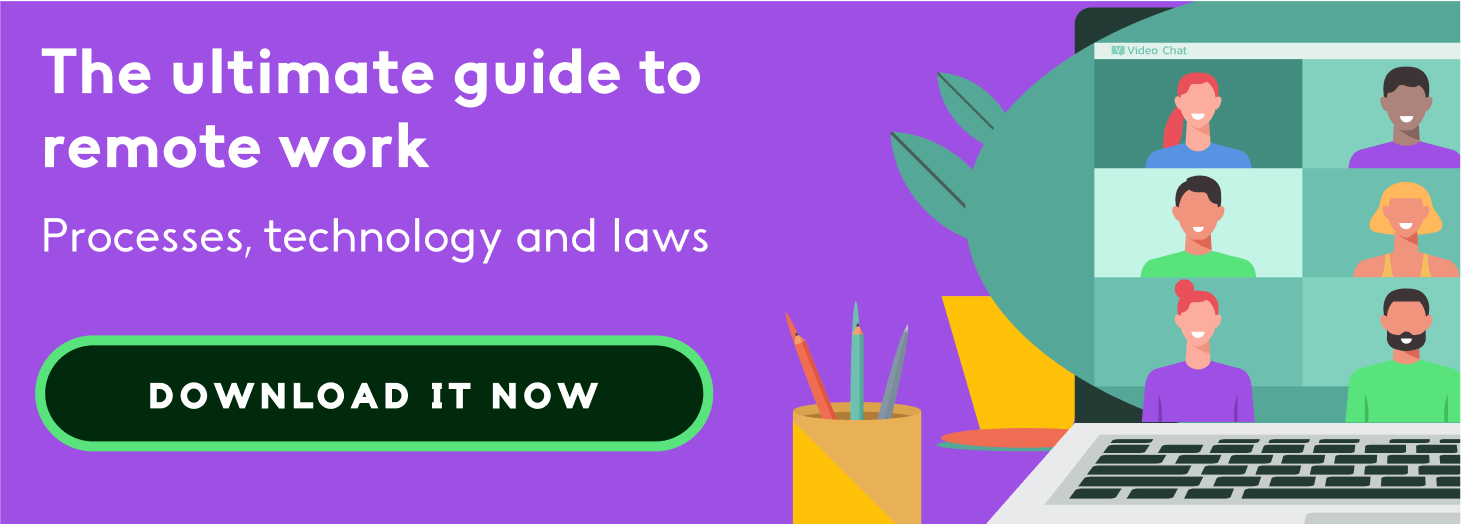How to manage work from home employees based on personality types

The next round of promotions will put introverts in the spotlight: contrary to working in the office, introverts have the advantage while working remotely. We explain how to manage employees working from home; who will benefit the most, and who needs a little more support.
Working quietly in their own homes without drawing attention to themselves feels quite normal to introverts. For those who work differently, however, it’s rather difficult to understand. The louder ones among us always have something to say and take centre stage. They play a leading role and leave a lasting impression. Bosses often interpret this behaviour to mean that extroverted employees are more active, have everything under control and push the company forward. Too often, this strategy works perfectly.
On the other hand, the calmer and oftentimes more technically skilled employees fall behind: meetings, team events, open-plan offices are obstacles for introverted employees. Introverts can either struggle within an organisation or blossom like a well-watered flower, depending on their working environment.
In her international bestseller "Quiet: The Power of Introverts in a World That Can’t Stop Talking", former lawyer Susan Cain writes that we live in a “society that has a cultural bias towards extroverts at the expense of introverts and the wider economy.” In order to survive in corporate culture, introverts have had to “adopt extroverted behaviours leaving them with less mental and physical stamina to do their work.”
“When introverts act like extroverts, it’s very stressful. It’s not their natural behaviour.”
- Susan Cain
That doesn’t sound fair or smart considering that introverts make up 30 to 50 per cent of the workforce, according to Cain. With the global skill shortages we face today, organisations and managers can’t afford to lose this amount of talent, energy and happiness.
The transition to remote work enforced by COVID-19 pandemic has meant that employees find themselves in reversed roles. After all, introverts seem to adapt to working from home, far away from noisy open-plan offices, much easier than extroverts. In a way, it’s their natural habitat. This, however, places a significant burden on extroverts who may see their mood, productivity, and overall work performance suffer as a result of not being able to socialise.
Don’t leave your staff behind feeling frustrated. Read our leadership tips to help manage your employees who struggle with working from home.
How to manage work from home employees
Whether you are shy and reserved or a sociable, self-confident person, a broad personality description probably won’t do you justice. Nevertheless, you can discover the most essential aspect of your being with one specific question: How do you recharge your batteries - alone or in the company of others?
Every colleague who drops in, every phone call, every email and even friendly small talk potentially robs introverts of the energy they need for their work. After working all day in an open-plan office, I often feel like a wrung-out sponge, just wanting to crash on the couch at home.
Social interaction tends to drain considerable energy away from introverts, as opposed to extroverts, who feel energised from their interactions with others.
Remember, as an HR expert in your organisation, you usually know your people pretty well and should manage your staff accordingly. Use their strengths and weaknesses to your advantage.
Dealing with introverts
- Respect the fact that introverted employees work best when they’re quiet and focussed. Managers should be patient, and use chats or e-mails to communicate, for example. This way, you won’t distract them and give them much-needed space.
- Allow calmer employees the time and opportunity to express their opinion in meetings and conferences.
- Introverted people tend not to discuss personal issues and don't like meaningless small talk. Lunches with the whole office can also be much too much for them. Accept that introverted people have different needs for closeness, so don't assume they’re being distant or arrogant.
- Involve your introverted employees explicitly, especially if they are doing well at work. They find it rather difficult to blow their own trumpet.
- Likewise, create a culture of trust where everyone feels comfortable.
- A lot of introverts blossom with flexible workplace models and are easy to manage work from home employees.
- Introduce silent hours, whether at home or in the office, to tap into the full potential of your employees. Allow an hour or two of concentrated work without interruptions of emails or slack messages, so employees can focus and deliver results.
- Once people return to their offices, allow different types of flexible workplace models, and occasionally give introverts their much-needed space.
Why remote work might be perfect for introverts
Just think back to the last office party where everyone had a good time and your merry colleague asked you for the millionth time: "Why are you always so quiet?” Before you roll your eyes, you direct them towards the door and wait for a chance to discreetly sneak away. You get home exhausted, and reflect on the noisy society we live in, and how you don’t fit in. A high level of self-confidence, sociability and the ability to present oneself well seem to count more than anything else in working life.
But it sometimes only takes a few changes to create an introvert-friendly workplace and harness their full energy. They enjoy focussing on one task at a time and prefer scheduled meetings to chance encounters where they are obliged to make small talk. A quiet, solitary environment is often more conducive to productivity and creativity for introverts than an office, where more social interaction is required and distractions frequently arise.
These circumstances make introverts the perfect candidates for remote work and can be easy to manage work from home employees. You can even encourage the more introverted colleagues to share their best practices and working from home productivity hacks with those who may be struggling with remote work.
And while some may argue that the lack of the proverbial “water-cooler chatter” is a downside of working remotely, for introverts, this facet of remote work may actually be a big bonus. No more awkwardness when running into colleagues, battles over who chews gum too loudly in the office, and when to switch off the radio.

Managing extroverted employees
None of this means that extroverts are unsuited for remote work. Quite the opposite, in fact. A balanced schedule including both telecommuting and in-office work can be largely beneficial to both extroverts and introverts.
- A little small talk won't hurt. Light conversation can help break the ice, so take your time to get to know them better and make them feel heard.
- Take a look behind the façade. Not everyone who always comes across as super self-confident is actually like that underneath. Even the loudest joker isn’t necessarily the superficial type. So don't judge them too quickly.
- Extroverted people love attention and feedback. When they are praised for a job well done, it boosts their motivation.
- Extroverts oftentimes feel socially isolated when working from home, so encourage regular virtual team meetings, Skype lunches and check in on them regularly with some face time.
- To help extroverted employees acclimatise to remote work, find ways to maintain the social interactions of an office setting. Provide regular check-ins via video calls, create chat rooms in messaging platforms like Slack, or schedule webinars.
- Use video conferencing instead of the usual phone calls. There are endless possibilities for individual and team interactions - Facetime, WhatsApp, Teams or Zoom. Use them not only for business interactions but also for the usual coffee break and maybe a team lunch.
Personal traits of successful remote employee
There are plenty of great personality tests out there to assess your employee’s character traits and hence, to find the most suited ones for a specific position. One incredibly powerful test is the DISC personality test which determines your employee’s personality profile based on four DISC types. Standing for Dominance, Influence, Steadiness and Conscientiousness, it measures your tendencies, preferences and your patterns of behaviour.
Another one of the most well-known tools for mapping employee personalities is the Myer-Briggs Type Indicator (MBTI). It identifies if an employee's personality leans toward one of two tendencies such as extraversion vs. extroversion, for example.
Regardless of whether you are an introvert or extrovert, not everyone is suited to working from home. This will mainly depend on the personality types and basic attitude of the employee. Those who are easily distracted, perform tasks too slowly or deliver poor work results may prefer to work in the office.
For employees that show the following characteristics, working from home might just be the perfect solution:
- Self-discipline: The number one trait to work remotely meaning employees do what they need to, even when they dread doing it.
- Reliability and conscientiousness: Ask employees how and where you can support them better. Create an open space for communication while managing employees working from home, and check in with employees who may need some extra help.
- Organised working methods: Having systems set in place and knowing your productivity hacks is key for a successful remote employee.
- Adherence to delivery dates: Meeting tight deadlines, even when there is a lot going on at home, helps enormously when the project team is spread across different locations. Setting clear goals and deadlines is vital if employees are to meet them on time.
- Honesty: This is a no-brainer. Is your employee really working on this dreadful Excel sheet or just making up some numbers? Performance checks come in handy here.
- Initiative and communication skills
- Tech-savvy: When you work from home you're pretty much on your own. If your computer acts up and you don't possess at least a modicum of technical ability, you'll be spending many unproductive hours on the phone with customer service.
- Calmness: Remote workers have their fair share of emergencies such as power outages or lost data. But they must handle these events in ways that help rather than make things worse.
Working remotely in a low-impact environment
As we’ve learned, the ratio of introverts to extroverts is likely to be approximately 50:50 in today’s working society. Nevertheless, in these fast-moving, digitalised and rapidly changing times, you could be excused for thinking that society is dominated by extroverts. In order to create an optimal work atmosphere, HR managers should ask themselves how to manage employees working from home depending on their personality type.
All employees would probably benefit if companies created quiet workplaces, in addition to rooms for meetings and casual chats. Introverts, however, particularly benefit from the opportunity to work in a low-impact environment - because their creative energy comes from within.
Trying to bend personality types doesn’t usually work, especially with staff working remotely. Therefore, organisations need to find out for themselves how they can harness and facilitate the different ways of working. At the end of the day, we’re all different. And it's precisely these differences that ultimately define success.
Are you looking for more information on how to manage employees working from home? With Kenjo’s free remote work eBook you’ll discover the superpower of managing remote teams, improving their productivity and making them feel part of a bigger cause.

